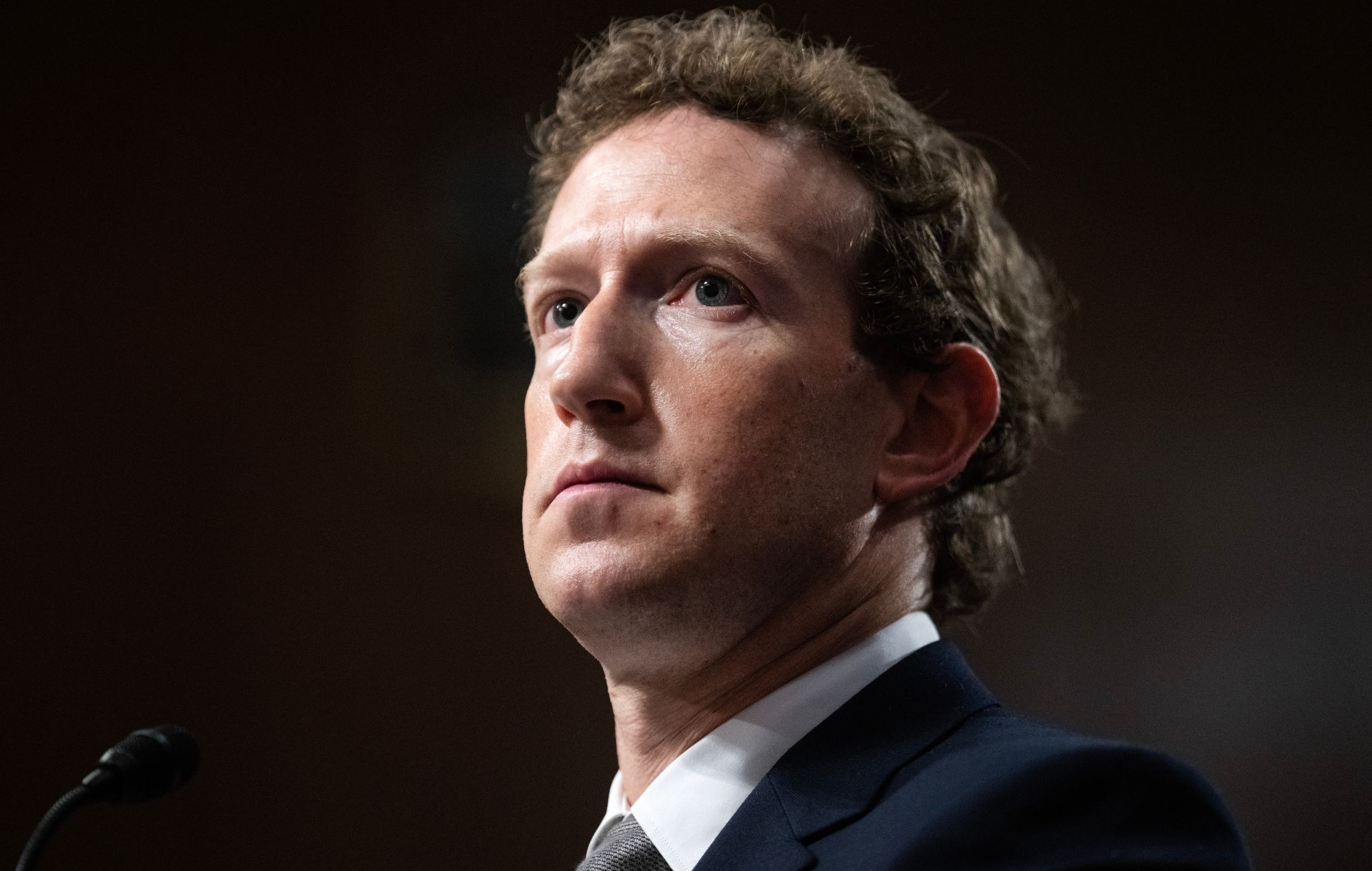Mark Zuckerberg has spoken out about the use of artificial intelligence (AI) in the creation of music, and said that it may lead to some “interesting” but “soulless” tracks.
READ MORE: In the age of AI Oasis, there’s no point being ordinary
The Facebook creator opened up about the highly divisive topic during a new appearance on the Track Star show. As part of the interview segment, he took part in a quiz, where he had to identify songs within just seconds of hearing them.
During the interview, he shared his love for a range of different artists, including Olivia Rodrigo – who he said he “loves” and introduced his daughters to – and Daft Punk, who he named as one of the main artists he was listening to when creating the coding for Facebook back in 2004.
About halfway through, Zuckerberg correctly identified a song by American punk trio Green Day, before the host asked him if he believes a band – with the help of AI – could ever be “as good as” Billie Joe Armstrong and co.
“AI will probably be able to produce technically interesting music,” he responded. “But it may sometimes feel a little soulless because it lacks the other parts of the human connection.”
The comments about the use of artificial intelligence in the music industry come just months after the Meta CEO made headlines for endorsing open-source AI. According to a report from Musically, August saw Zuckerberg pitch his company’s open approach to its AI models “as a contrast to the more-closed workings of that sector’s big disrupters”.
His stance was backed by Spotify CEO, Daniel Ek, who joined him to share a joint blog post, encouraging European regulators to get on board.
“A key opportunity for European organisations is through open-source AI – models whose weights are released publicly with a permissive licence,” the post read. “This ensures power isn’t concentrated among a few large players and, as with the internet before it, creates a level playing field.”
Unsurprisingly, the use of AI in creative fields such as songwriting is one that has both rapidly grown in recent years, and divided fans and artists alike.
Back in April, Billie Eilish, Robert Smith, Stevie Wonder and Nicki Minaj were among the famous artists who signed an open letter warning against the “predatory” use of artificial intelligence (AI) in music.
Created by non-profit organisation, Artist Rights Alliance, the open letter was titled ‘Stop devaluing music’ and urged developers, technology companies, and platforms and digital music services to “pledge that they will not develop or deploy AI music-generation technology, content, or tools that undermine or replace the human artistry of songwriters and artists or deny us fair compensation for our work.”
Mark Zuckerberg in 2024. CREDIT: Jeff Bottari/Zuffa LLC via Getty Images
Besides the aforementioned artists, 200 other musicians also signed the document, including Katy Perry, Sam Smith, Kim Petras, R.E.M., Jon Bon Jovi, Mumford & Sons, Imagine Dragons, d4vd, Jon Batiste, Finneas, Fletcher, Pearl Jam, J Balvin, Jonas Brothers, Noah Kahan, Norah Jones, Yard Act, The Last Dinner Party, Zayn Malik, Smokey Robinson, Sheryl Crow, Sigrid, the estates of Bob Marley and Frank Sinatra, BTS‘ label HYBE and many others.
Shortly before then, the debate came into the spotlight once again, when a new act was approved in Tennessee to protect musicians from AI deepfakes. That move came after several US politicians argued for the need for legislation to catch up with advancements in AI technology after graphic AI images of Taylor Swift circulated widely on social media in January.
It follows ongoing legal issues between the creative world and tech firms over the use of their work to train artificial intelligence models such as ChatGPT. Among the 11,500 signatories from across the music, film, theatre and writing world pushing back against the use of intellectual property without permission are Billy Bragg, Kevin Bacon, Robert Smith, Julianne Moore, Kazuo Ishiguro, Ann Patchett, Rosario Dawson and more.
The debate started to gather rapid momentum towards the end of 2023, when the Council of Music Makers (CMM) shared an open letter about the “profoundly tone-deaf” government hearing on the impact of AI.
Just weeks before that, the CMM published five fundamental rules that they want companies to embrace when it comes to developing music AI technologies.
The outlined five key objectives to ensure that all training, licensing and commercialisation of music-making generative AI models in the music sector can be developed in a way that is both helpful to creators and respective of their rights.
Industry heavyweights have consistently criticised the use of AI, with Nick Cave saying the use of it in music was “unbelievably disturbing”, and Peter Hook claiming: “Every AI song that has ever been written is shit”.
The post Mark Zuckerberg says “AI will probably be able to produce technically interesting music” but “may feel soulless” appeared first on NME.


